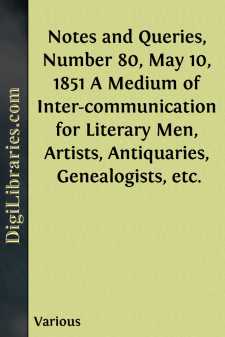Categories
- Antiques & Collectibles 13
- Architecture 36
- Art 48
- Bibles 22
- Biography & Autobiography 813
- Body, Mind & Spirit 142
- Business & Economics 28
- Children's Books 15
- Children's Fiction 12
- Computers 4
- Cooking 94
- Crafts & Hobbies 4
- Drama 346
- Education 46
- Family & Relationships 57
- Fiction 11828
- Games 19
- Gardening 17
- Health & Fitness 34
- History 1377
- House & Home 1
- Humor 147
- Juvenile Fiction 1873
- Juvenile Nonfiction 202
- Language Arts & Disciplines 88
- Law 16
- Literary Collections 686
- Literary Criticism 179
- Mathematics 13
- Medical 41
- Music 40
- Nature 179
- Non-Classifiable 1768
- Performing Arts 7
- Periodicals 1453
- Philosophy 64
- Photography 2
- Poetry 896
- Political Science 203
- Psychology 42
- Reference 154
- Religion 513
- Science 126
- Self-Help 84
- Social Science 81
- Sports & Recreation 34
- Study Aids 3
- Technology & Engineering 59
- Transportation 23
- Travel 463
- True Crime 29
Notes and Queries, Number 80, May 10, 1851 A Medium of Inter-communication for Literary Men, Artists, Antiquaries, Genealogists, etc.
by: Various
Description:
Excerpt
The first of May, eighteen hundred and fifty-one, will be remembered in the Calendar for centuries after those who witnessed its glories shall have passed away. Its memory will endure with our language; and the Macaulays and Hallams of the time to come will add brilliancy to their pages by recounting the gorgeous yet touching ceremonial of this great Apotheosis of Peace. Peace has occasionally received some foretaste of that day's glory; but only at times, when the sense of its value had been purchased by the horrors which accompany even the most glorious warfare. But never until the reign of Victoria were its blessings thus recognised and thus celebrated, after they had been uninterruptedly enjoyed for upwards of a quarter of a century. Who then, among the thousands assembled around our Sovereign in that eventful scene, but felt his joy heightened by gratitude, that his lot had been cast in these happy days.
It was a proud day for Queen Victoria, for her Illustrious Consort, for all who had had "art or part" in the great work so happily conceived, so admirably executed. And we would add (even at the risk of reminding our readers of Dennis' energetic claim, "That's my Thunder!") that it was also a proud day for all who, like ourselves, desire to promote intercommunication between men of the same pursuits,—to bring them together in a spirit, not of envious rivalry, but of generous emulation,—to make their powers, faculties, and genius subservient to the common welfare of mankind. In our humble way we have striven earnestly to perform our share in this great mission; and although in the Crystal Palace cottons may take the place of comments, steam-engines of Shakspeare, the palpable creations of the sculptor of the super-sensual imaginings of the poet, the real of the ideal,—still the GREAT EXHIBITION OF THE INDUSTRY OF ALL NATIONS is, in more senses than one, merely a MONSTER NUMBER OF "Notes and Queries." So palpable, indeed, is this similarity, that, if the long-talked-of Order of Civil Merit should be instituted, (and certainly there was never a more fitting moment than the present for so honouring the cultivators of the peaceful arts), we make no doubt that "Notes and Queries" will not be forgotten. Should our prophecy be fulfilled, we need scarcely remind our readers of Captain Cuttle's injunction and our Motto.
And here, talking of prophecy, we would, first reminding our readers how, in the olden time, the Poet and the Prophet were looked upon as identical, call their attention to the following vision of our Queen in her Crystal Palace, which met the eye when in "fine phrensy rolling" of the Father of English Poetry, as he has recorded in his House of Fame. Had Chaucer attended the opening of the Exhibition as "Our own Reporter," could his description have been more exact?
THE TEMPLE Y-MADE OF GLAS.
A Prevision by Dan Chaucer, A.D. 1380.
Now hearken every manir man
That English understandè can,
And listeth to my dreme to here,
For nowe at erst shall ye lere:
O thought, that wrote al that I met
And in the tresorie it set
Of my braine, nowe shall men see
If any vertue in thee bee
To tellen al my dreme aright
Nowe kithe thy engine and thy might!
* * * * * *
But, as I slept, me mette I was
Within a temple ymade of glas,
In which there were mo images
Of gold, standing in sundry stages,
Sette in mo rich tabernacles,
And with perrie mo pinnacles,
And mo curious portraitures,
And queint manner of figures
Of gold worke, than I saw ever.
But all the men that been on live
Ne han the conning to descrive
The beaute of that ilke place,
Ne couden casten no compace
Soch another for to make,
That might of beauty be his make;
Ne so wonderly ywrought,
That it astonieth yet my thought,
And maketh all my witte to swinke
On this castel for to thinke,
So that the wondir great beautie
Caste, crafte, and curiositie,
Ne can I not to you devise,
My witte ne may not me suffise;
But nathelesse all the substaunce
I have yet in my remembraunce,
For why?...












